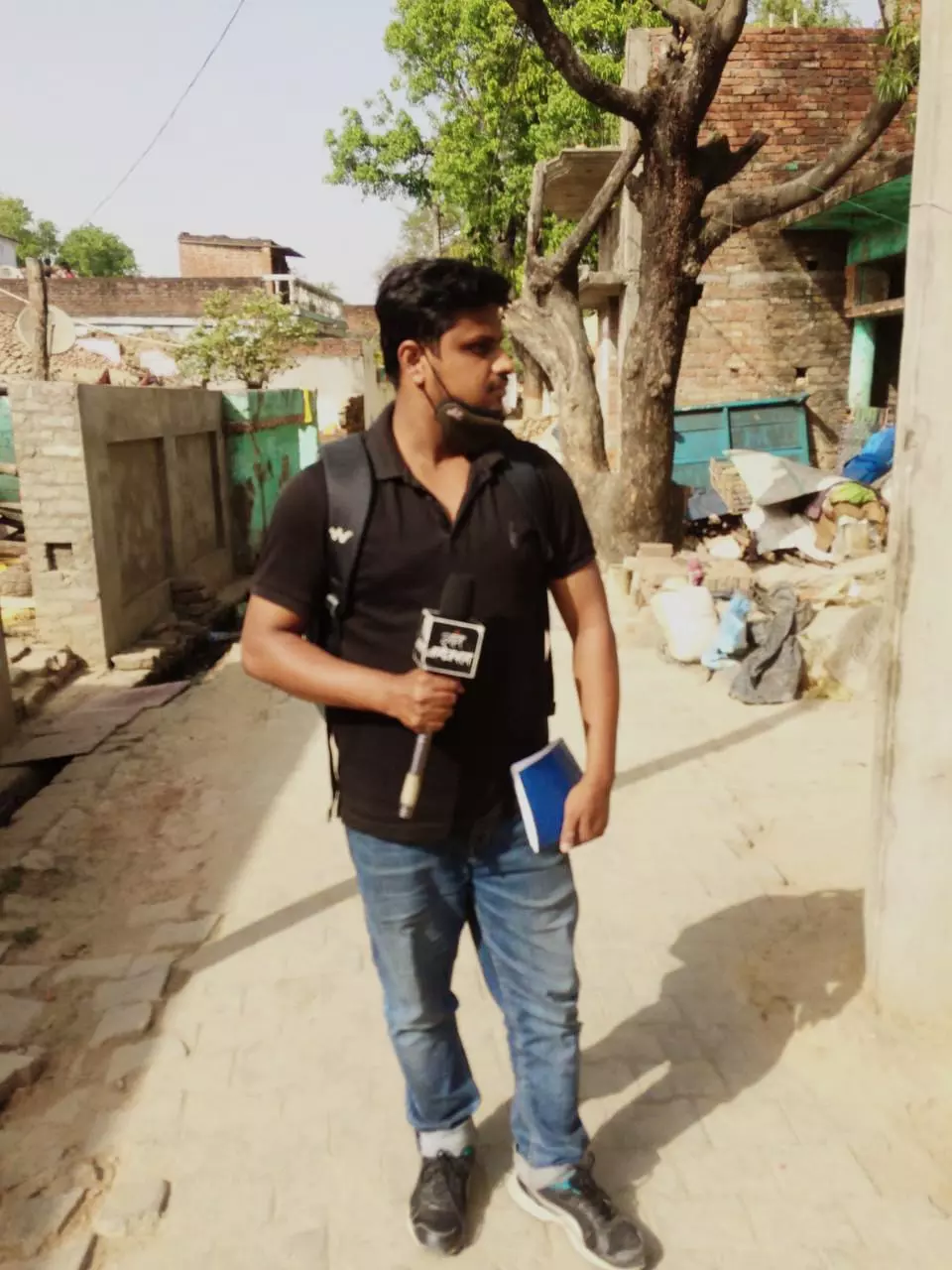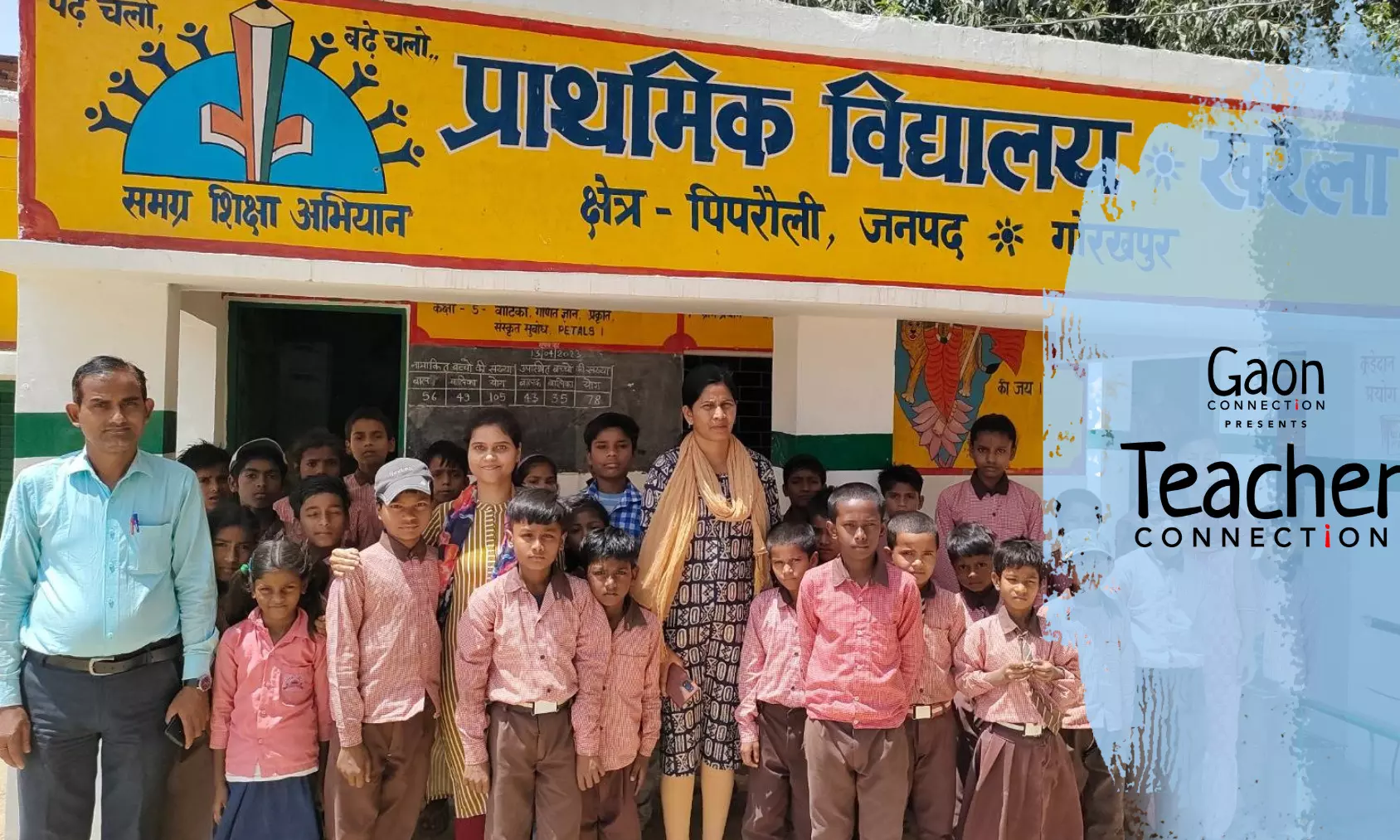Creating a level playing field in the classroom
The classroom is as much for the slow learners as it is for the others, believes Nirmala Singh, a primary school teacher in Gorakhpur, Uttar Pradesh. Not only does she stay back after school hours to revise a lesson and explain concepts, Nirmala thinks nothing of dropping in at her students’ homes to bring them to school.
 Pratyaksh Srivastava 9 Jun 2023 5:02 AM GMT
Pratyaksh Srivastava 9 Jun 2023 5:02 AM GMT

Nirmala Singh in a group photograph with her classroom students. All photos by Pratyaksh Srivastava
Khairaila (Gorakhpur), Uttar Pradesh
On a balmy summer afternoon, the single storeyed school building basked in the sun. In a classroom, Sultan sat on the edge of his bench, hands raised to ask a question to his teacher, Nirmala Singh, who was teaching mathematics. It was his favourite period that was underway.
“Haasil [carry method in addition] is my favourite and I can solve it easily. I also use it while getting ghar ka samaan [groceries],” the 10-year-old student told Gaon Connection. He swiftly showed off with a mental addition he did in no time at all!
Last year, when Sultan was in class three, the story was very different. He frequently bunked his classes and could grasp nothing of what was being taught in school. His school, the Government Primary School Khairaila in Gorakhpur’s Piprauli block in Uttar Pradesh, was the last place he wanted to be.
But, one day, Sultan was taken aback to see his teacher Nirmala Singh, accompanied by some of his classmates, come to his house, and brooking no protests, took him back with them to the school.
Also Read: The Fondest Corner in a Govt Primary School
On her part, that was not the first time nor the last that 39-year-old Nirmala went out of her way to ensure her students attended school regularly. The primary school teacher teaches mathematics and Hindi to classes one to five. And, she endeavours to bring all the children to a level playing field.
“Each child is different, and they have a different pace of learning. The classroom is as much for the slow learners as it is for the others. The extra time we spend with such students is what is called remediation,” she said.
Remediation is one of the micro practices NIPUN (National Initiative for Proficiency in Reading with Understanding and Numeracy) has spelt out for increasing the impact of learning amongst students. The NIPUN scheme, launched by the Union Ministry of Education in 2021, focuses on strengthening foundational literacy and numeracy skills, commonly known as FLN, in students studying in classes one to three.
Nirmala has used remediation as a means to help academically weak students, such as Sultan, cope with their studies. And he is now among the brightest kids in class 4. “Earlier I could not do sums at all, but now I can do them easily,” Sultan said with a twinkle in his eyes.
Empathy, a cornerstone of remediation
Explaining the nuts and bolts of remediation, Nirmala said, “To begin with, we screen all the students and identify children who need extra help in the classroom. For instance, we have identified around 30 such students out of the total 112 in our school.”
“This identification has to be done with empathy. We make sure that those students who have to stay back after school for remedial classes do not develop an inferiority complex that further hampers their learning,” she said.
The NIPUN scheme, launched by the Union Ministry of Education in 2021, focuses on strengthening foundational literacy and numeracy skills, commonly known as FLN, in students studying in classes one to three.
Also Read: The ‘Jadui Pitara’ Works its Magic in the Classroom
Once screening is done, the next step is to make children comfortable and confident. “I ask them about their favourite songs, food, cartoon characters and other things. I make them recite poems and sing songs or talk about their favourite things. This helps them open up and helps them become comfortable communicating in class too,” Nirmala added.
From blackboard to notebook
Teachers are encouraged to write down questions in a way the students can understand better, in their individual notebooks, rather than on the blackboard.
“On the blackboard I write down questions for those students who can read and answer on their own. Meanwhile, I go to the desks of the students who I know struggle and write the same questions, but in a way they will easily understand,” the 39-year-old teacher said.
When the child takes interest in studies at school, eventually the parents also start showing an interest in their ward’s education.
“The switch from blackboard teaching to notebook teaching makes them feel more comfortable and the one-on-one sessions with them help them overcome their fear and shyness,” she said. “We repeat and explain the fundamental concepts of a lesson any number of times till they get it,” the teacher added.
The benefits are showing
“Earlier, I used to find it hard to understand what was being taught in the class, especially in mathematics,” Shivani, a class three student confessed shyly. “Nirmala ma’am then sat with me and taught me addition. Now, I can easily do double digit addition,” she said confidently.
“It took us about a year of work with Shivani to bring her up to par with the rest of the class and now she easily does the sums that are given in class and follows all instructions,” Nirmala, the proud teacher, smiled at Shivani.
Remediation is one of the micro practices NIPUN (National Initiative for Proficiency in Reading with Understanding and Numeracy) has spelt out for increasing the impact of learning amongst students.
An extra mile
As part of remediation micropractice, the teachers also spend an extra half an hour after school with the children. This time is used to revise what was taught in class that day. The teachers have found that the students also feel more confident about asking questions more freely to clarify their doubts.
And when the child takes interest in studies at school, eventually the parents also start showing an interest in their ward’s education.
For instance, Sultan’s mother Raeesul Nikah told Gaon Connection that she was happy to see her son take interest in the homework which his teacher asks him to do.
“Earlier, I never saw him with a book at home but now almost daily he is sitting with a notebook and a textbook. There is a marked change in his attitude towards studying. I can sense that the teacher’s efforts are paying off,” the mother said.
According to Radhe Shyam Maurya, the headmaster of the school, “The remedial measures were crucial in bridging the chasms left by the COVID-19 pandemic where education came to a halt.”
Also Read: A teacher holds ‘exclusive’ classes to educate rural girls about menstrual hygiene
“Unlike private schools, these kids are not privileged enough to have smartphones or a high speed internet connection for online learning. But it was these remedial measures adopted by the teachers that saved the day and got the students back on track,” he pointed out.
Nirmala knows what it is to be poor, and the importance of education. “My parents were illiterate. My father worked as a crane operator in a mine. We were six siblings and the money my father earned was never enough,” Nirmala said.
“But my father ensured that we siblings completed our studies even if that meant eating noon-roti [salt and flat bread] to save money for our education,” she added in a choked voice.
Nirmala’s trip down the memory lane is interrupted as there is a sudden uproar in the classroom behind her. A class monitor comes rushing to breathlessly report that Sarthak, a class one student, was planning to ‘escape’ from school!
“It is his first day at school, that is why he wants to go home. Tell him nicely to go back to class, I will join him in a few minutes,” Nirmala said, without turning a hair.
It was just another incident in the life of the primary school teacher. She knew all would be well.
#NIPUN
More Stories




